The Best Simpsons Episodes of the ’10s
The Simpsons gets older, but still cracks wise in seasons 23 through 33, as the nation divides over what and when is too much.

“Did you know there’s a direct correlation between the decline of Spirograph and the rise in gang activity? Think about it,” Bart was warned during The Simpsons’ “Golden Era.” He says he will, but we know he won’t give it even a passing thought. The same could be said about the series in the 2010s. As viewership went down over the decade, the country splintered into opposing factions, without much thought. The citizens turned away from trusted media output, and after beating Gunsmoke as the longest-running, scripted primetime show in history, The Simpsons was an institution.
The decade opened with a big 20th anniversary premiere, “Once Upon a Time in Springfield,” promoted as the 450th episode of the series. It ran alongside a special, aired after a year’s buildup from Fox, called The Simpsons 20th Anniversary Special – In 3-D! On Ice!, directed by Morgan Spurlock (Super Size Me). The show even supersized its presentation, airing episodes in 720p high-definition, and a new opening sequence, including 3D animation, which replaced the one which had been running since season 2 in 1990. The Simpsons would go on to crack 500 episodes in season 23’s “At Long Last Leave.”
With great responsibilities come great weight, and Homer had already undergone liposuction, as well as bigger threats. It was possible The Simpsons just might have been more profitable if it was canceled, and on Oct. 4, 2011, 20th Century Fox Television started to weigh the profits of syndication deals with the advantages of new episodes. After all, one of the things they were thinking of was a cable channel that would only air The Simpsons episodes. In the end, the cast, creative, and production team took a pay cut. The decade ended with the series becoming property of The Walt Disney Company, and the subject of a 14-day marathon on FXX.
The Simpsons celebrated their 20th birthday with a bang, they’d nabbed dozens of Primetime Emmy Awards, released a film, The Simpsons Movie, which was a box office smash, and got their own 44 cent stamp from the United States Postal Service. The Simpsons’ recognition as elder states-show ate away at its subversive roots. Sunday nights opened to newer animated mischief, while the series catered to the celebrity elite, often resembling “Lisa Goes Gaga” from season 23. By this time, the series was even recognized for telling the future, and after no one heeded the predictions of the Donald Trump presidency, history became increasingly redundant.
When Sideshow Bob (Kelsey Grammer) was mayor of a small village in the season 17 episode “The Italian Bob,” running in 2005, Marge chided Homer for doing an impression of Mussolini on a balcony for the masses, Homer explains he was trying to do Trump. In that same episode, The Simpsons chided Family Guy for its knockoff quality, listing Peter Griffin on the pages of “I Criminale Americani” under famous “plagiarismo.” South Park had long been calling out the Seth Macfarlane series for its repeating performances. But one of the highlights of The Simpsons’ 2010s decade happened in Family Guy‘s double-length Season 12 premiere, “The Simpsons Guy.” Though not a Simpsons episode, the crude and brilliant Animation Domination crossover features the casts of both shows, who ultimately agree to co-exist, as long as they stay “half-an-hour away from each other.”
The Simpsons’ season 26 episode “Simpsorama” (2014), was a crossover on home turf. Groening often said he preferred Futurama to The Simpsons, and by the end of the episode, Homer is in full agreement, bonding with Bender, until Professor Frink fiddles with some wiring and learns the robot’s mission to the past is to kill Homer.
What do you do when you’re the longest-running show in the history of TV? If you’re a cartoon like The Simpsons, you go back to the drawing board. The writers found new ways to tell old stories, overlooked scenarios to toss to old characters, and innovative ways to construct the town of Springfield, and its favorite family.
Here are the 10 best-constructed 10 episodes of the 2010s.

10. Brick Like Me
Season 25 Episode 20 – May 5, 2014
Written by Brian Kelley. Directed by Matthew Nastuk.
A gimmick episode that stacks up, “Brick Like Me” tied the Lego Movie with The Simpsons‘ Lego play-set, and the alternate reality was jarringly unified. Homer hallucinates about the jagged edges of The Simpsons’ original design, and wonders where he fits in the new world. It’s a Lego universe and the Simpsons only live in it. Two years in the making, and highly anticipated at the time, it was a milestone at episode 550.
Everything fits and no one gets hurt in “Brick Like Me.” While slightly more kid-friendly, the episode commits to subversive humor from the opening establishing shot where Homer and Marge fall apart during sex. The Simpsons unblocks itself, making jokes about being a cartoon, and refits the Bible myth to Lego parameters that prove that religion can’t be true. The construction of Springfield is minutely detailed, from the Brik-E-Mart to Brick Block and Beyond, even Moe’s Love Tester is Lego-friendly.
The episode works best because it builds on the relationship of the Simpson family. Homer proves himself a great dad not by spending a whole day with Lisa making a mini-Lego brewery that really brews but by always being completely honest. Comic Book Guy puts the first pieces together, and the rest fall into place.
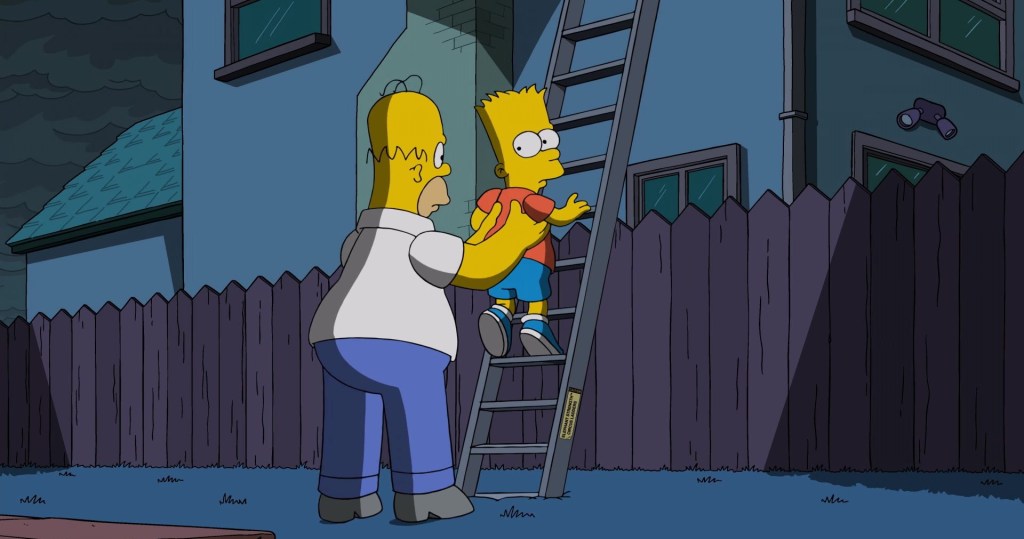
9. Flanders’ Ladder
Season 29 Episode 21 – May 20, 2018
Written by J. Stewart Burns. Directed by Matthew Nastuk.
In a parody of M. Night Shyamalan’s horror classic, The Sixth Sense, Lisa suggests to Bart that he sees dead people, and viewers could discern the tell-tale crimson doorknobs, sweaters, and even Radioactiveman dolls in the young Simpson’s red room. Yes, Bart already showed signs of shining in the “Treehouse of Horrors” segment “The Shinning,” but once he ascends “Flanders’ Ladder” to the astral realm, it’s all work and little play for the boy who could climb higher than his overweight father.
The episode begins with a real fright: lightning knocks out the Simpsons’ internet. All tech is wired into a deadly current, and the family has to entertain themselves with old-school diversions, like board games and videotapes. Rather than watching reruns of “Saved by the Bell,” which Homer calls “The hit show that launched no one’s career,” the Simpsons attempt to steal Wi-Fi from the Flanderses, shocking Bart into a coma. Without a Ouija board in sight, Lisa opens Bart’s no-girls-allowed left hemisphere to anyone who might enter.
Maude Flanders, the dead wife of Ned Flanders, is the first ghost in, and the last to get closure. Bart goes through both the stages of grief and the rungs of broken life dreams first. He helps Milhouse’s child psychiatrist, who killed himself to guilt his clients, get revenge on a guy who won’t shut up about his Tesla; ponders Shari Bobbins’ melodic request to “help me get vengeance against all jet engines;” and promises to whack Johnny Tightlips, ice Fat Tony, and put a hit on Joey Doublecross before he can’t ignore Maude anymore.
The dilemma is, Mrs. Flanders died because of Homer, and wants revenge. Bart’s father proves too heavy a weight to bear the light. Bart’s predictions in the conclusion carry an even heavier dark humor.
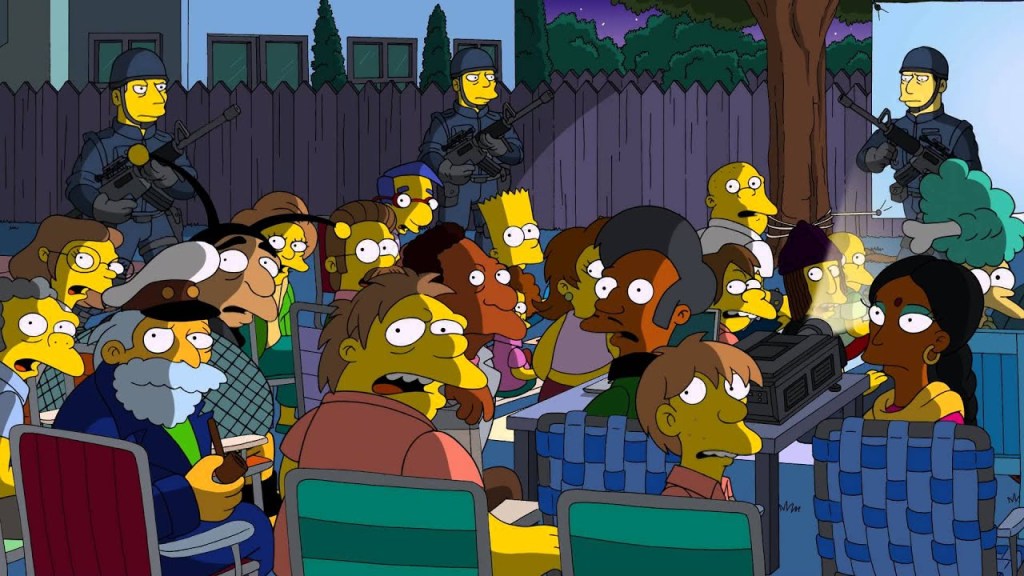
8. Steal This Episode
Season 25 Episode 9 – Jan. 5, 2014
Written by J. Stewart Burns. Directed by Matthew Nastuk.
“Best of all, we’ll never have to sit through an annoying commercial again,” Homer promises as “Steal This Episode” cuts to its first ads, the only crime where he doesn’t take the blame. After getting shunned at the water-cooler for missing “Radioactive Man Re-Rises,” Homer wins back the town of Springfield by showing first-run Judd Apatow films in his backyard Cinema Pirate-Diso. And the sweetest thing about it, besides sending Ned to Hell for seeing a bit too much side action, is the film was illegally downloaded, for free. “But Hollywood says stealing from Hollywood is wrong,” Marge protests, and a classic showdown is preempted by a commercial break.
The FBI apparently takes movie pirating very seriously. Agents who joined to catch serial killers mean nothing when there’s a war on intellectual property. As a wife, Marge promised to love and honor, aid and abet, but when she mails back the $12 she would have spent on a legal theater ticket, she passes on more than savings. She issues a death sentence.
“I’m here to arrest and hopefully stage the prison suicide of the mastermind of this operation,” promises FBI’s anti-piracy boss Detective Gratman, voiced by a manic Will Arnett. He calls in Judas Priest’s Rob Halford for a heavily metallic plea for “respecting the law, the copyright law.” With movies like “Sex Friends,” “World War Zebra,” “Slug Family Robinson,” and “Neptune Needs Nephews” on the line, this is a serious matter.
Poor Homer, his only crime was breaking the law. He steals from the rich, takes out the ads, and gets out of jail, free to turn himself back in, again at Marge’s urging. “Steal This Episode” is best watched on an illegal site, the only place where you can see “Cosmic Wars Episode VII, A NEW TAKE,” now that a rift in the space-time continuum erased episodes I, II, and III.
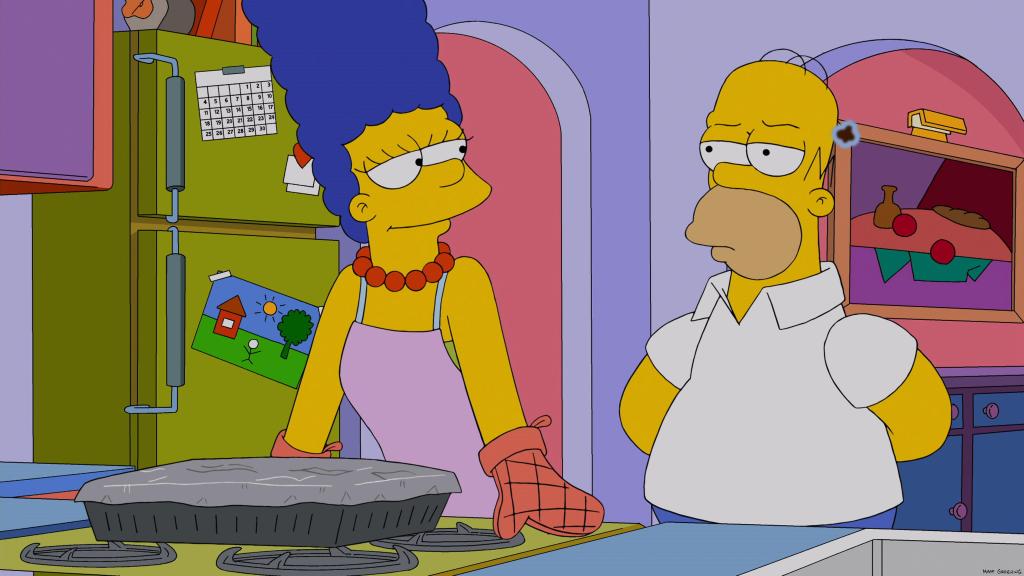
7. Specs and the City
Season 25 Episode 11 – Jan. 26, 2014
Directed by Lance Kramer, written by Brian Kelley
“Specs and the City” isn’t a holiday episode: the sign outside the Springfield Nuclear Plant still reads “Merry Christmas, the happiest workday of the year.” But it opens when Mr. Burns bestows the first cool gift his nuclear working troglodytes have ever gotten at year end, far superior to the usual anti-stress ball that warns “one more squeeze and you’re fired.”
Oogle Goggles won’t protect your eyes from the spilled vats of acid which ate through Radioactive Man, but they will shield you from reality, trading it in for enhanced reality. The prescient state-of-the-art solar-powered computer glasses act like a GPS-generated Google search, and can point out interesting locales, fascinating facts, and the real ingredients of Krusty Burgers: 17% Hamster bedding, 49% newspaper inserts, 34% sand emptied out of bathing suits.
The device is mainly an insidious espionage tool from Mr. Burns but, as the episode took its title from the HBO series Sex and the City, the Oogle Goggles have more urbane uses. The sequence where Homer is guided through a bedroom romp with Marge doesn’t miss a spot, or appropriate pause for sweet talk. The goggles probably even remind Homer to buy flowers.
You can’t give a wedgie to a bully who doesn’t wear underwear, and you shouldn’t have to buy the world’s greatest Valentine’s Day card for one. Bart takes on both Nelson and Valentine’s Day, a bully whether you’re wearing goggles or not. No matter how hard you try it’s never right, so why try?
The “Wednesday” sequence is sublime. As a mother and a wife, Marge puts up with a lot. Homer may be down to two beers in the shower, but he also converted all their money into the euro, a sandwich, not the official currency of the EU. It turns out, those rumors about moms wanting things are true, and all that enabling drains you by Tuesday nights. Marge needs her reset every Wednesday, when she sees, as Homer learns through the omniscient spectacles, a therapist.
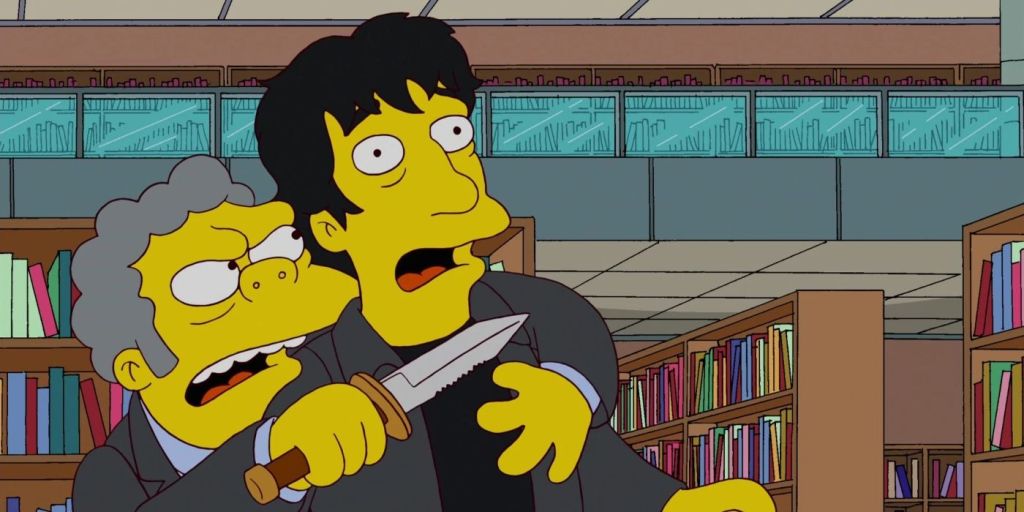
6. The Book Job
Season 23 Episode 6 – Nov. 20, 2011
Written by Dan Vebber. Directed by Bob Anderson.
“The Book Job” is an expert parody of heist movies, with a direct focus on Ocean’s Eleven, but revealing the thievery of assembly-line book publishing. Lisa, having encountered an actor playing her favorite author, T.R. Francis, becomes disenchanted with children’s novels put together in executive boardrooms using the latest market research, allowing writers to churn out ten books a year.
Hearing this, however, Homer envisions the perfect crime: The Book Job, which brings the show into Steven Soderbergh territory. He puts together “The Crew,” which flashes as a title card, just like in the movies: Seymour Skinner, who knows how pre-tweens think; Patty Bouvier, a fantasy literature buff; Moe, whose eyes tear up over more than his pickled onions; and Professor Frink, who owns a computer. Guest voice, author Neil Gaiman, wants to join, and is promptly put to work with a lunch order. Bart lays down the new outline.
“The vampire genre is all sucked out,” Bart says, “all we gotta do is find a new monster to be our hero.” Moe would be far too frightening for impressionable young minds, but the concept works if you replace him with an orphan troll living under the Brooklyn Bridge, in school with cool elves, pixie cheerleaders, and the stoners are gargoyles, just like on Netflix’s Wednesday. Yes, The Simpsons predicted that too. The writing gaggle flesh out the perfect Young Adult Novel. Seeing her father’s new endeavor for what it is, a book mill, Lisa decides to write her own novel, and immediately hits writer’s block.
The Heist happens at the Springfield Book Fair, with a consultation with the head of TweenLit, Inc., and Lisa provides “The Score,” where the crew steal their book back in “The Actual Heist.” It’s more than a latte at Bookaccino’s, it’s the hit novel they are going to sell, credited to Gaiman.
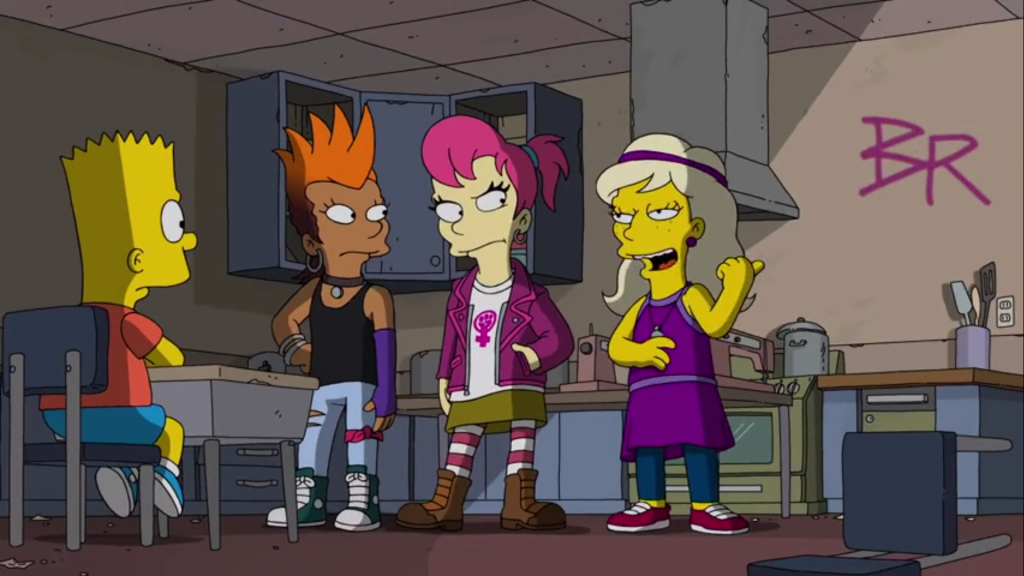
5. Bart vs. Itchy and Scratchy
Season 30 Episode 18 – March 24, 2019
Written by Megan Amram. Directed by Chris Clements.
Principal Skinner does not negotiate with terrorists. He just gives in. With “Bart vs. Itchy & Scratchy,” The Simpson caved to modernization, giving equal time for the bad girls to teach the poster-child bad boy a lesson in uproarious disruption.
The episode begins at KrustyCon, which has it all, from Krusty Vape Pens to Sideshow Bob’s Prison Art Gallery. Sensing female power as the newest bandwagon to jump on because girls love the way he panders to them, Krusty announces an all-female reboot of “Itchy and Scratchy.” Bart is devastated. Lisa is elated. The Springfield elementary boys stage a boycott, turning off the TV at the exact moment the segment airs.
But the reboot not only serves up just the right amount of over-the-top gore, it’s just as funny as the original, and when Lisa catches Bart on camera laughing at the dismembered heads, he is forced to take a long hard look at himself. Bart gets radicalized, becoming the ultimate feminist, proudly donning the knitted Pussy Riot-style ski hats of the school’s Bossy Riot gang. Judging them not on their gender, but on their pranks, of which they are experts, Bart joins as their slave, and they nickname him “Novaries.” Bart knows Lisa would respect him for being in Bossy Riot, but only admits it because it destroys her idea he’d never do something so forward thinking.
Milhouse puts together a support group called BRA (Boys Right Association) which commits act of rebellion like the “hate-not-watch.” In terms of creativity, they are nowhere near the professional agitprop movement of Bossy Riot, but their accidental BRA burning inadvertently saves the original “Itchy and Scratchy.” Lisa has her greatest later-era growth spurt during the episode, finding her gang, and bicycling into truly new territory.
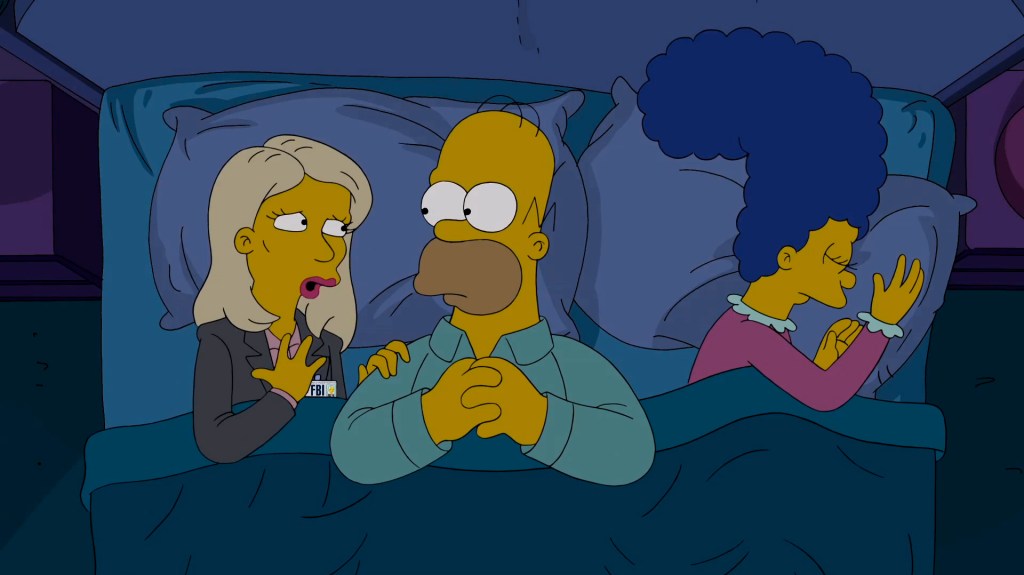
4. Homerland
Season 25 Episode 1 – Sept. 29, 2013
Written by Stephanie Gillis. Directed by Bob Anderson.
“25 YEARS AND THEY CAN’T COME UP WITH A NEW PUNISHMENT,” Bart scribbles on the blackboard as the series inflicts the pain of parody on the Showtime series Homeland. “Homerland” sees Homer acting strange since returning from the nuclear power convention. Calmer, nicer, he’s stopped eating pork, given up beer, forgoes Cheeto dust for green beans and slivered almonds, and moves his body during sex. But when he is on the verge of being Lisa’s dream dad, it goes too far. Only a terrorist could pretend to be this nice.
Lisa calls Annie Crawford, voiced by Kristen Wiig, from the FBI to investigate. Homeland viewers get a basketful of thematic Easter Eggs, like whiplash inducing twists, perky but delusional FBI, and hippie environmental terrorists in VW buses, but the gimmick doesn’t get in the way of the story, which is expertly hidden in the details. The episode is loaded with references and visual jokes beyond the Homeland tribute. Marge hides “smart-drugs” like Focusyn, Blissium, Brozak and Crystal Math in Bart’s breakfast cereal, Belfast Charms, which are “tragically delicious.” Quik E Fresh chickens are “humanely run over.”
Homer’s relationship with Lisa mirrors the Brody/Dana relationship on Homeland, but her knowledge of her father is really what makes the episode special. Bart tells Lisa she is incapable of experiencing joy, the kind of person who reads Sylvia Plath on a rollercoaster, yet, she is the one who brings Homer back to his senselessness.
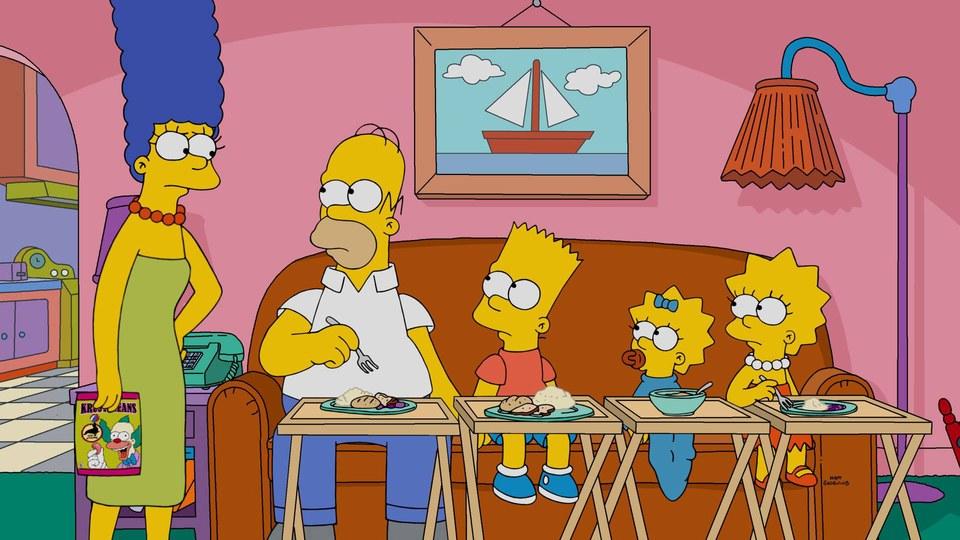
3. Trust But Clarify
Season 28 Episode 5 – Oct. 23, 2016
Written by Harry Shearer. Directed by Michael Polcino.
Written by frequent guest star Shearer, who co-wrote This Is Spinal Tap, “Trust But Clarify” is a classically-structured, double-narrative episode of The Simpsons. After a deconstructive cubist couch gag which questions reality itself, the episode opens with an “Itchy and Scratchy” cartoon, “Mousetrapping a Murderer,” complete with a rendition of the Making a Murderer musical theme. It is a perfectly subversive encapsulation of the episode.
Springfield’s top anchor at Channel 6 News, Kent Brockman, is fired for reporting news first person and singular, and is replaced in disgrace by Arnie Pyle, the traffic reporter in the sky. Meanwhile Krusty the Clown’s new Krustaceans snacks are delicious but deadly. A trope which goes as far back as his cereal Krusty-Os, replaced by Chocolate Frosted Frosty Krusty Flakes, which promised “Only sugar has more sugar.” The new secret ingredient is formaldehyde.
Lisa and Bart are at the forefront, once again solving problems unsolicited by minor characters. In a rising TV journalistic tradition, Brockman stumbles into a new world of what passes for news. The talking head newscaster has the largest forehead in the news business, no interesting ancestors, and never heard of the Talking Heads. He trades in yesterday’s leisure suits for a David Letterman beard, and speaks without fear, until his very glibness is rewarded, and he returns to the status quo. Probably brought to you by one of Krusty’s nutritiously-negligible nibbles, it was a minor landmark. The chalkboard read “THE FIRST EPISODE OF THE SECOND 600.”

2. Angry Dad: The Movie
Season 22 Episode 14 – Feb. 20, 2011
Written by John Frink. Directed by Matthew Nastuk.
“Don’t thank me, thank Hollywood for being completely out of good ideas,” says Erman Millwood (Maurice LaMarche), owner of the chair company who took possession of BetterThanTV.com cartoons which offers Bart a place to make his Angry Dad dreams come true. The character created in “I Am Furious (Yellow)” from season 13 is a new sensation, starring in the number 1 non-porno site, which makes it the 10 trillionth popular website overall. The nickel and dime animation studio, which made all the bad Popeyes, is offering to turn Homer’s public humiliation into a feature film.
Bart is quite the animated cineaste, saying he’s “always loved cartoons, going way back to the early SpongeBobs.” Homer reluctantly voices the character he can never escape. Everything looks like the film will be a hit, even the test screening gets a standing ovation, until the projector is turned on. At Lisa’s suggestion, Bart slices the movie to its core and it is nominated for Best Animated Short at the Golden Globes, allowing the series to begin its assault on awards. Ricky Gervais gets to be one of the episode’s many guest voices, but there is a sign displayed prominently near the red carpet saying not to let him host.
On a roll, the short film “Angry Dad” gets an Oscar nomination, which leads to the best sequence of the episode. Each of the films it is running against are expertly rendered in spoof form. The film “Condiments” is accompanied by a clip which parodies the Pixar animation style of Toy Story. The “Willis and Crumble” cartoon, called “Better Gnomes and Gardens,” is a wonderful replication of Wallace and Gromit, with Nick Park putting in a guest voice appearance.
Bart sends Homer and Marge sightseeing in Los Angeles while he and Lisa go to the awards. Upon winning, Bart thanks Lisa for giving him the idea, and a visibly moved Homer chops the Oscar into individual pieces for everyone on the animation team, because the award can only get five dollars on eBay.
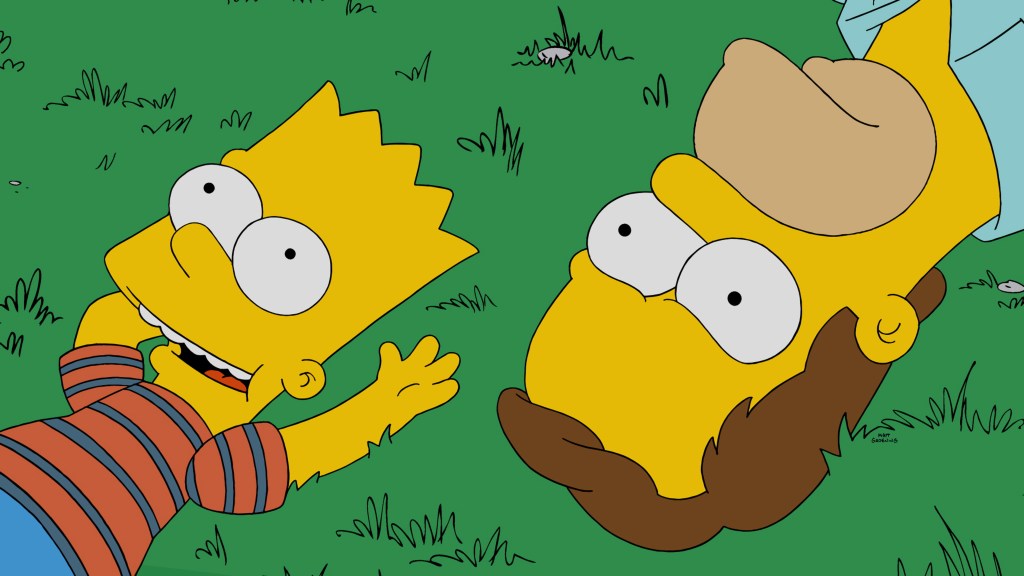
1. Barthood
Season 27 Episode 9 – Dec 14, 2015
Written by Dan Greaney. Directed by Rob Oliver.
“Barthood” isn’t a parody of Richard Linklater’s Boyhood, as much as it is a loving tribute to it. The episode follows Bart as he grows from six to 20, skipping the years The Simpsons takes place in real time, but staying true to the film’s chronological structure. A self-contained story, “Barthood” is a flash-forward episode, outside of the regular timeline and not part of the full canon. Together, the family enjoy the poignancy and wit of one of the most definitive coming-of-age films.
Bart is a talented but overlooked artist, partly because his art has a destructive bent, but also because most people are focused on his sister. Lisa is bright, accomplished, and unself-conscious, settling for Yale while inventing the artificial pituitary gland. Her achievements continue to be lauded into Bart’s teen years, where competition for Homer’s approval brings out Bart’s more vandalistic tendencies, like crashing the family car through the kitchen. Homer finds himself in the role of the disciplinarian.
Bart bonds with Abe, who shows his grandson how to channel the rage. Besides driving Abe around in the 1959 Studebaker Starlander Commander, Bart is always on a bike or skateboard; he never graduates to driving a car. He’s also endearingly clueless to the advances of the sexually self-aware Terry and Sherry. Even Lisa and Nelson get back together, and Maggie grows up to date her dreaded nemesis, the baby with the one eyebrow.
While father-son and grandfather and son relationships dominate the episode, Marge is still the most sweetly indulgent mother of enablers, understanding Bart’s need for approval. But the most rewarding growth comes from the siblings. Lisa’s faith in Bart gives him the spark to plug the hole in his life, bringing his artistic talents to customizing mountain bikes in his own shop. Lisa will go far in life, and Bart will always be there, right behind her, borrowing money.
